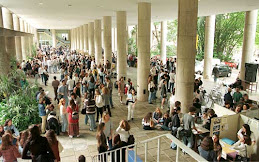US stereotypes are not only caused by the President and leadership, but by the impressions that others get of American’s living in their countries. I have experienced two types of Americans living abroad. The first type, are those that come to the country to really learn the culture, participate in every aspect of daily life, absorb themselves in the opportunities, and really respect the people. The other type, are those that give Americans a bad name. You know the ones. Loud, obnoxious, and disrespectful (with or without intentionally doing it). In Brazil right now, it seems to me that more and more type 2 kinds are coming to scout out business opportunities. With Brazil’s economy growing at 5% while the rest of the world is still climbing out of the financial crisis, investors are seeing the personal benefits that expanding into the Brazilian market brings them. Although some of these people really do mean well and give back to the communities they live in, others are, in my opinion, just continuing the ancient practice of imperialism with a new modern twist. They give little thought to the damage that they are doing to the people there.
For example, I recently visited Rocinha (the largest favela in South America) with my Community Development class, led by several people in our class who live there. Our first stop was the top of the morro where we wandered into a bar/restaurant/pool table lounge/car repair shop/owner’s home to talk to the man who owned it about this particular area of the community. He told us that after the recent heavy rainstorm and flooding that caused mudslides within other favelas, the government was using the opportunity to “relocate” over 13,000 families from this part of Rocinha to the outskirts of the city. The government claims it is for the people’s safety, but this man told us of a different reality. He said that the people that built these “houses” piled one on top of the other, are the same people who also often work for the Brazilian government as construction workers and have built most of Rio. They know what they are doing and the structures are sound. He said that the government is hoping to relocate these people so that they can sell the property (with a perfect location near the tourist areas and gorgeous view of the whole city and beaches) to make room for a high-rise hotel. In fact, the government closed the school for “safety reasons” that served to educate the local children. Now, the government argues that the people there are living in a dangerous area without access to education and that they should move to a “better” environment an hour and a half away from where they currently live. The community is currently organizing efforts to rebuild the school out of their own pockets to make it harder for the government to kick them out.
Many foreign businesses are beginning to see the areas that favelas now inhabit (often with the best views of the city) as moneymakers and are trying to take over the property. These enterprising individuals often don’t realize how much damage they are really doing, and only see the personal gain.
I guess people in developing countries are used to being used. One brazilian asked me “so you are just learning Portuguese so that you can get a good job back in the US, right? Will you ever come back?” Of course I will be back. You probably won’t be able to get rid of me now ☺ But this is not the sentiment that they expect.
My host mom is always so surprised and impressed when I leave “Zona Sul” where I live and visit friends in less affluent parts of the city. She told me about another girl who lived with her for some time and never left this area. She described the girl as “very very American.” “What do you mean by that?” I asked, and then she realized her mistake. “I’m sorry but many American’s I have met are very closed-minded and only see what they want to see.”
The American stereotype abroad sucks. For this to change, it not only takes a change in foreign policy at the upper-most levels of government, but also the change in attitude of those millions of Americans living abroad. Can we change it? Yes we can ☺
Subscribe to:
Post Comments (Atom)




No comments:
Post a Comment